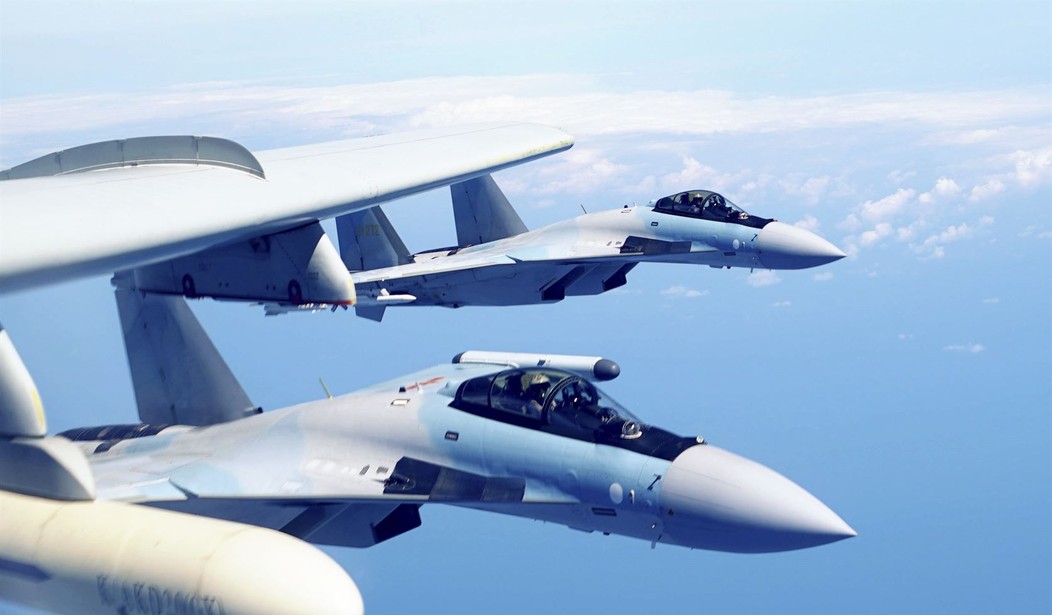One can hardly deny that China has become more bellicose over the last few years. It's also impossible to deny that China still, after all this time, views Taiwan as a breakaway, rogue province and would like nothing more than to take it back and place it under Chinese Communist Party (CCP) rule. But China has some very troubling problems of its own: An economy in trouble, a population that's dropping off a demographic cliff, and a corrupt, totalitarian government.
That doesn't mean that they might not, at some point, try to take Taiwan anyway. On Monday, in the Asia Times, the scribe Gabriel Honrada walks us through some of China's issues.
In estimating China’s possible timeframe for a Taiwan conflict, Timothy Heath and other writers note in a June 2023 RAND analysis that Taiwan is most vulnerable to defeat in the first 90 days of a Chinese invasion.
Heath and others mention that due to Taiwan’s military disadvantages and low durability, a US intervention would be required to repel a Chinese invasion within that timeframe. Without a US intervention, they note that China’s overwhelming military resources would likely allow it to subjugate the self-governing island Beijing considers a renegade province.
There's another way to read that: "If China can't take Taiwan in 90 days, they're in trouble." But can China cross that strait with enough troops to take Taiwan in the first place? And more to the point, can they keep those troops supplied with beans, bullets, and fuel? In military matters, amateurs study tactics, while professionals study logistics; wars are always won or lost because of logistics.
And China might not be able to pull that off.
Asia Times noted in October 2023 that, at the minimum, the People’s Liberation Army (PLA) might need to land 300,000 to 400,000 troops in Taiwan to quickly seize the island, following swift and sharp air and missile decapitation strikes that aim to take out Taiwan’s civilian and military leadership.
But should that fail, the PLA may have to send as many as 2 million troops to Taiwan, including police and paramilitary personnel, to ensure a three-to-one or five-to-one numerical superiority against the defender.
A three-to-one advantage is pretty much the minimum numeric advantage for an attacking force taking on a prepared defense. Add to that the difficulty of crossing all of those people, all their equipment, all their vehicles, across the strait and then keeping them supplied.
That's a major challenge, even for a country with China's resources. And China has certainly been watching the ongoing Russia/Ukraine conflict with great interest, as Russia is invading a country with which they share a long land border, and despite a considerable material advantage, has managed at best a stalemate, at most a high-tech war of attrition that will devour lives on both sides like a nightjar gulping down mosquitoes.
But wait! There's more!
Task and Purpose, in a video this month, notes that as the PLA modernizes its equipment, it will need highly educated, technologically savvy personnel to operate it.
However, it mentions Chinese cultural views of the military as a lowly career, high emigration from China, increasing physical and psychological conditions among potential recruits, corruption in the PLA, the long-term impact of the One Child Policy and the perceived hardships of military life over a lucrative civilian career all contribute to China’s military manpower shortage.
However (there's always a, however, isn't there?) China has been building its navy aggressively for some time. At present, the Chinese People's Liberation Army Navy (that's really what it's called) can't really project power globally, mostly due to the lack of at-sea replenishment, but they certainly can use their frigate navy to support an invasion of Taiwan.
So, yes, China may be able to take Taiwan. It will be costly, horrendously so, to both sides, but they could likely do it. And if I were in Taiwan's government, I would be very concerned about the United States' promises to come to Taiwan's aid, especially under the current feckless, directionless leadership. Taiwan would be well advised to make its defense plans based on standing alone because, in such matters, it's wise to plan for the worst and hope for the best.
But keeping Taiwan? While Taiwan has no Second Amendment and no centuries-old tradition of defiance like the United States, there would still very likely be a resistance movement against the Communist invaders that would go on for generations.
So, can China take Taiwan? Probably, at a considerable cost. Can they keep Taiwan? That's much less clear.

